In a groundbreaking study set against the backdrop of Afghanistan’s prolonged conflict and social upheaval, researchers have meticulously validated the Dari version of the widely recognized 21-item Depression, Anxiety and Stress Scale (DASS-21). This development marks a pivotal advance in mental health assessment tools tailored specifically for one of the most linguistically and culturally complex populations in the world. Published in BMC Psychiatry, the study offers vital insights into psychological evaluation within conflict zones, where the burden of mental health disorders is alarmingly high yet often underassessed due to linguistic and cultural barriers.
Mental health disorders such as depression, anxiety, and stress often coexist in a triad of debilitating psychological states, particularly intensified in settings marred by chronic conflict and instability. The World Health Organization estimates that approximately ten percent of the population residing in such conflict-affected regions suffer from moderate to severe mental health conditions. Afghanistan’s prolonged exposure to war, displacement, and socioeconomic challenges exacerbates the urgency for reliable, culturally-adapted psychometric tools to identify and address these conditions effectively.
The 21-item Depression, Anxiety and Stress Scale (DASS-21) has long been respected in clinical and research contexts for its brevity, comprehensive coverage, and diagnostic reliability in diverse populations worldwide. Despite its widespread global use, the scale had not been validated in Dari, the dominant language spoken by millions of Afghans. This language gap has significantly hindered psychiatric research and mental health interventions, which require tools that resonate linguistically and culturally with the target populations.
This extensive cross-sectional study, conducted over a four-month period in 2023, enrolled 1,318 participants from various regions across Afghanistan, emphasizing a predominantly female demographic (69%) with an average age of 32 years. The researchers meticulously administered the Dari-translated DASS-21 to this sample, aiming to rigorously examine its psychometric properties, such as internal consistency, test–retest reliability, and convergent validity using established depression and general health questionnaires.
The statistical evaluation revealed exceptionally high internal consistency for the overall scale (Cronbach’s α = 0.94), demonstrating that the Dari version of DASS-21 is internally stable and dependable. Each subscale—measuring depression, anxiety, and stress respectively—also displayed strong reliability coefficients, with alpha values of 0.860, 0.832, and 0.883. These figures surpass commonly accepted reliability thresholds in psychometric research, underscoring the scale’s suitability for this population.
Test–retest reliability, a critical metric to ascertain the stability of psychological instruments over time, yielded intraclass correlation coefficients (ICCs) ranging from 0.784 to 0.916 across subscales. These robust values confirm that repeated assessments using the Dari DASS-21 produce consistent results, reinforcing its applicability for longitudinal studies and ongoing clinical monitoring in Afghanistan’s challenging environments.
To further authenticate the scale’s validity, the study investigated its convergent validity by correlating DASS-21 scores with those derived from the 20-item Center for Epidemiologic Studies Depression Scale (CES-D-20) and the 28-item General Health Questionnaire (GHQ-28). The significant positive correlations observed affirm that the Dari DASS-21 is effectively measuring psychological distress constructs consistent with other internationally validated mental health instruments.
This rigorous psychometric validation establishes the Dari DASS-21 as a dependable and culturally congruent tool for mental health screening across diverse Afghan populations. The researchers advocate for its integration into public health frameworks and research endeavors designed to address the far-reaching mental health repercussions of chronic conflict and displacement in Afghanistan.
Nevertheless, the authors caution that their findings are primarily based on a non-clinical sample skewed towards females, highlighting the necessity for additional validation studies encompassing clinical populations and broader sociocultural groups within Afghanistan. Such future investigations would enhance the generalizability and diagnostic utility of the Dari DASS-21 and could foster the development of targeted interventions to alleviate mental health burdens in this vulnerable context.
Beyond Afghanistan, this study exemplifies a crucial methodological blueprint for adaptively translating and validating psychometric instruments in languages and cultures often marginalized in global mental health research. Addressing linguistic barriers not only advances scientific rigor but also ensures that mental health services are inclusive, culturally sensitive, and tailored to the specific needs of diverse populations worldwide.
This innovative validation effort underscores the intersection of cultural linguistics, psychiatric epidemiology, and public health, encapsulating how careful instrument development can pave the way for improved mental health diagnostics in conflict zones. Ongoing refinement and deployment of such tools are fundamental to mitigating the invisible yet profound psychological toll exacted by chronic conflict on millions of individuals.
In an era where mental health is increasingly recognized as a pivotal pillar of global health, the validation of the DASS-21 in Dari is more than an academic achievement—it is a beacon of hope. It equips clinicians, researchers, and policymakers with a critical instrument to discern, understand, and ultimately address the nuanced psychological effects borne by Afghans enduring prolonged adversity.
As Afghanistan confronts numerous challenges, this advancement in psychological assessment signifies a meaningful stride towards elevating mental health awareness and care. By leveraging psychometrically sound tools adapted specifically for Dari speakers, stakeholders can better identify at-risk groups, allocate resources more effectively, and design culturally appropriate mental health interventions to foster resilience and recovery.
This milestone underscores how scientific inquiry, grounded in cultural competence and linguistic precision, can transform mental health landscapes in regions where trauma and upheaval have long been normalized yet insufficiently documented. The Dari DASS-21 stands poised to become an essential component in the ongoing mission to bring mental wellness within reach for many more lives touched by the enduring conflict in Afghanistan.
Subject of Research: Validation of the Dari version of the 21-item Depression, Anxiety and Stress Scale (DASS-21) for assessing psychological distress among Afghan adults.
Article Title: Psychometric evaluation of the 21-item Depression, Anxiety and Stress Scale (DASS-21) among Afghans.
Article References: Neyazi, A., Rahimi, B.A., Mohammadi, A.Q. et al. Psychometric evaluation of the 21-item Depression, Anxiety and Stress Scale (DASS-21) among Afghans. BMC Psychiatry (2025). https://doi.org/10.1186/s12888-025-07613-6
Image Credits: AI Generated




